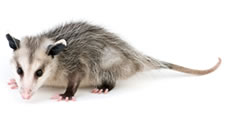While live wild animals are not as common as some other pest issues we encounter, they are certainly ones that Kastle Kare has experience treating. If you find that your residence or commercial property has a problem with opossums, raccoons or birds, we can help solve the problem. Our Technicians can humanely trap these wild animals and relocate them into safe areas, ridding your property of any risk and damage and ensuring they will not return. We also offer snake removal and control, including rattlesnakes.
Birds
We typically see more commercial properties having problems with bird infestations, than residential structures, but regardless of the location, a bird issue, most commonly with pigeons, is dirty and dangerous. Bird droppings carry viruses which can cause respiratory issues. For treatment of bird issues, our Kastle Kare technicians will use deterrents including wire and spikes which keep the birds from returning to the same location.
Opossums
These marsupials are small to medium-sized, with the largest just exceeding the size of a large house cat, and the smallest the size of a small mouse. They keep their feet flat on the ground, and the hind feet have an opposable digit with no claw. Opossums have a remarkably robust immune system, and show partial or total immunity to the venom of rattlesnakes. Opossums are usually solitary and nomadic, staying in one area as long as food and water are easily available. Some families will group together in ready-made burrows or even under houses. Though they will temporarily occupy abandoned burrows, they do not dig or put much effort into building their own. As nocturnal animals, they favor dark, secure areas. These areas may be below ground or above.
When threatened or harmed, they will “play possum”, mimicking the appearance and smell of a sick or dead animal. This physiological response is involuntary (like fainting), rather than a conscious act. In the case of baby opossums, however, the brain does not always react this way at the appropriate moment, and therefore they often fail to “play dead” when threatened. When an opossum is “playing possum”, the animal’s lips are drawn back, the teeth are bared, saliva foams around the mouth, the eyes close or half-close, and a foul-smelling fluid is secreted from the anal glands. The stiff, curled form can be prodded, turned over, and even carried away without reaction. The animal will typically regain consciousness after a period of between 40 minutes and 4 hours, a process that begins with slight twitching of the ears

